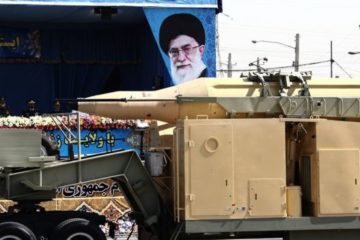Fiorina’s HP Earned Millions From Sales in Iran: Josh Rogin

©2015 Bloomberg View
NUOMV56S972I
(Bloomberg View) — On the campaign trail this year, Carly Fiorina has been a staunch advocate of keeping crippling sanctions on Iran, but under her leadership, Hewlett-Packard sold hundreds of millions of dollars’ worth of products to Iran through a foreign subsidiary, despite strict U.S. export sanctions.
Fiorina, who served as CEO of Hewlett-Packard from 1999 to 2005, often criticizes President Obama’s deal with Iran on the basis that he is agreeing to sanctions relief for Iran too quickly and in exchange for paltry concessions on the part of Tehran. In April, she said Iran sanctions were “unraveling fast,” something she called a “dangerous development.”
Fiorina often cites her time as a corporate executive as a credential for running for president and said in July she would back away from the Iran deal if elected and renegotiate. She has also warned that European countries, as well as Russia and China, are rushing “to open the Iranian economy.” She has also accused Iran of cheating on sanctions.
What Fiorina never mentions on the stump is that while she was in charge, Hewlett-Packard used a European subsidiary and a Middle East distributor to sell hundreds of millions of dollars of printers and other computer equipment to Iran.
HP’s unusual omnipresence inside Iran was first reported in 2008 by the Boston Globe, which discovered that in 1997 the company struck up a partnership with a new Indian company in Dubai called Redington Gulf. The partnership was so successful distributing in Iran that HP printers were No. 1 there,, with 41 percent of the market share by 2007.
All U.S. companies were banned from exporting to Iran in 1995, when President Bill Clinton issued two executive orders tightening sanctions on Iran in response to Iran’s support for international terrorism and pursuit of weapons of mass destruction. If HP executives knew about what the Dubai-based distributor was doing, they would have been breaking U.S. law.
After the Globe article came out, the Securities and Exchange Commission, which investigates violations of sanctions, wrote HP a letter inquiring about the Iran business. HP responded by saying that over $120 million worth of its products had been sold to Redington Gulf for distribution in Iran by a foreign subsidiary based in the Netherlands. Because these sales took place through a foreign subsidiary, HP denied violating sanctions law.
When Fiorina was running against Barbara Boxer for California Senate in 2010, her campaign denied that she had any knowledge about HP’s business in Iran. “It is illegal for American companies to do business in Iran,” her spokeswoman, Beth Miller, said at the time. “To her knowledge, during her tenure, HP never did business in Iran and fully complied with all U.S. sanctions and laws.”
Fiorina’s campaign did not respond to several requests for comment this week and last week.
But in 1999, HP’s general manager for the Middle East was quoted as saying, “Iran is a big market for Hewlett-Packard printers.” And Fiorina herself praised rising HP sales in the region in 2003, although she didn’t mention Iran, the San Jose Mercury News reported. Also in 2003, HP namedRedington Gulf, the Dubai-based distributor, its “Wholesaler of the Year.” Redington put out a press release that year stating, “The seeds of the Redington-Hewlett-Packard relationship were sowed six years ago for one market — Iran.”
HP severed ties with Redington Gulf after the SEC inquiry.
Later on in her 2010 campaign, Fiorina partially admitted HP’s business in Iran and defended it in an interview with Lady Globes magazine, on the basis that technology could open up Iran to the world. She said that the Iran business was “distributing printer ink,” which she said that was permitted in export law.
“But isn’t it wonderful that Dell PCs and Apple iPhones are in Iran, because this is why we know that a woman has been condemned to be stoned to death because she is accused of adultery. … The knowledge that we gain about was going on there is important. It gives us a human face on a brutal regime,” she said. “So I think in addition to crippling sanctions on the regime, we should be encouraging elements of political reform inside Iran, and one of the ways to do that is by selling communication in and out.”
Former officials who have worked on sanctions said that HP was using a loophole in the sanctions regime by routing their sales through a foreign subsidiary, which was a murky area in the law.
“At the time it was ambiguous to many people as to whether it was illegal or not,” said Richard Nephew, who managed sanctions on Iran at the White House and the State Department. “They were adhering to the letter but not the spirit, if it was at the direction of the parent company that this was done.”
He was dubious about the possibility that Fiorina did not know about the sales in Iran: “That’s kind of laughable.”
According to the Senate lobbying record, every year from 1999 to 2004, HP’s in-house lobbyists pressed Capitol Hill to pursue “unilateral sanctions reform legislation.” In 2013, adjustments were made to the sanctions regulations to allow sales of personal communications equipment like iPhones and personal computers, Nephew said.
In her July interview with CBS, Fiorina said, “I’ve never negotiated an Iran nuclear deal, but I’ve negotiated a lot of high-stakes deals, and there are a couple of rules, and every rule has been broken.”
HP’s business in Iran is one high-stakes deal that she won’t rush to take credit for. Whether she was aware of it or not, the affair doesn’t help her argument that her time as a CEO qualifies her to be president.
This column does not necessarily reflect the opinion of the editorial board or Bloomberg LP and its owners.
To contact the author of this story: Josh Rogin at joshrogin@bloomberg.net To contact the editor responsible for this story: Philip Gray at philipgray@bloomberg.net
For more columns from Bloomberg View, visit http://www.bloomberg.com/view







No Comment